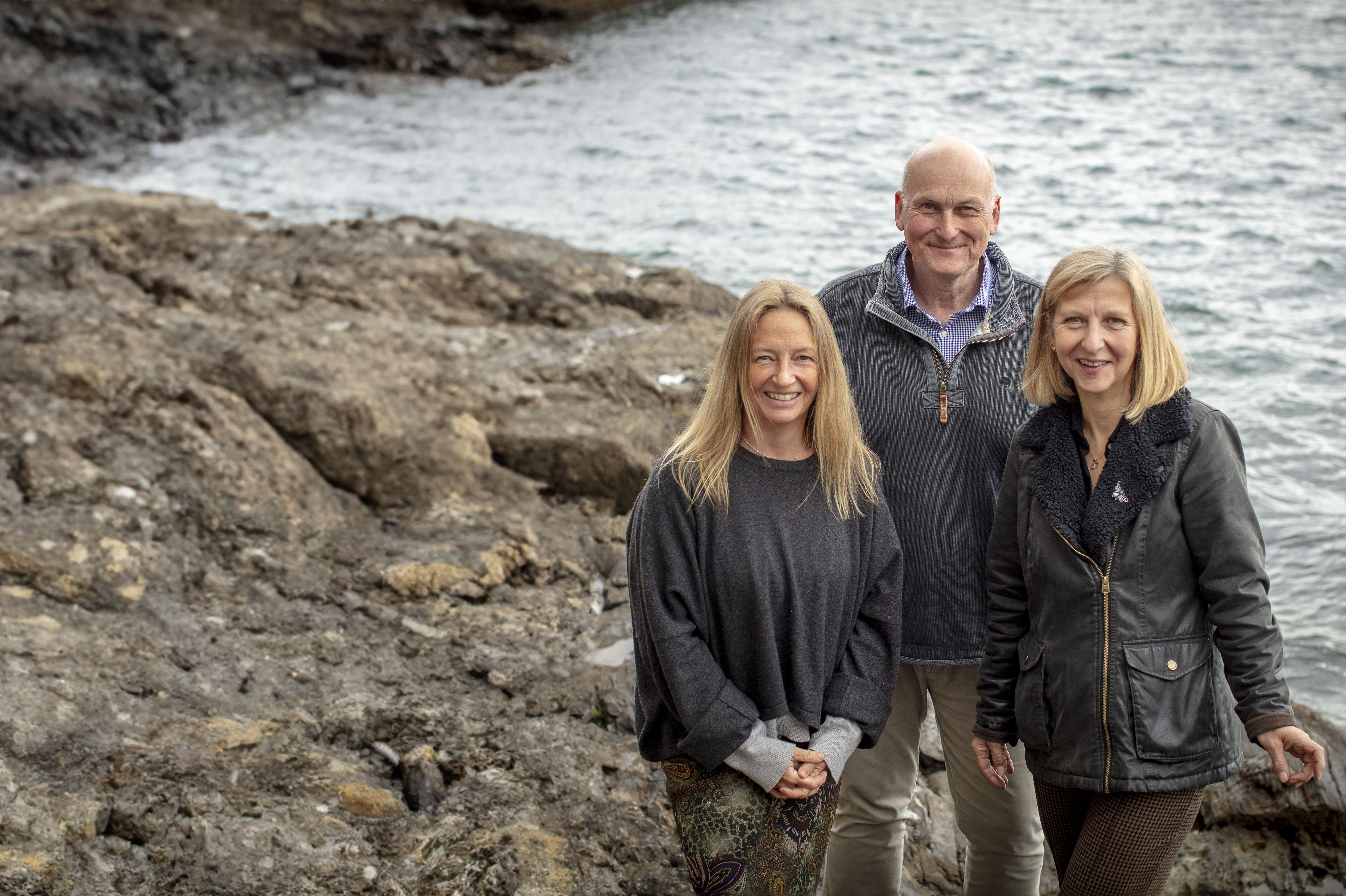Story
PML’s Professor Lindeque joint winner of prestigious Blue Planet Prize
14 June 2023
A trio of SW-based scientists were awarded for their research and influence on the global issue of marine microplastics.

Blue Planet Prize awarded to Prof. Penelope Lindeque, Prof. Richard Thompson and Prof. Tamara Galloway.
We are delighted to announce that PML’s Prof. Pennie Lindeque is part of a world-renowned trio that has been awarded the 32nd Blue Planet Prize, an international environmental award sponsored by the Asahi Glass Foundation and chaired by Takuya Shimamura, Director of AGC Inc.
Every year, the Foundation selects two winning individuals, groups or organizations who have made significant contributions to the resolution of global environmental problems.
This year the Asahi Glass Foundation have selected Prof. Penelope Lindeque (Plymouth Marine Laboratory) , Prof. Richard Thompson (University of Plymouth) and Prof. Tamara Galloway (University of Exeter) for their highly regarded research into microplastic pollution.
Award-winning microplastics research trio do it again
The trio demonstrated the existence of microplastics in the ocean, and have since charted the presence of plastics from the deep ocean to the highest mountains. They revealed microplastics are ingested by zooplankton and other marine species, and have made major advances in understanding the effects of microplastics on a wide range of marine organisms and ecological processes.
They have influenced global policy, legislation and action, calling on the international community to develop solutions that will help to address the growing problem of plastic pollution in the ocean, and helped inform the United Nations Treaty on Plastic Pollution that was signed by 175 nations in March 2022.
Furthermore, they have also raised public awareness and alerted industry about the dangers of microplastic pollution through television documentaries and other media, policy briefings and high-level presentations.
Prof. Richard Thompson, Prof. Tamara Galloway and Prof. Penelope Lindeque, commented:
“We are truly honoured to have been selected as recipients of the 2023 Blue Planet Prize. This award is further recognition that plastic pollution represents a global threat to the health of the ocean, its ecosystems and organisms, and the economies that rely on it.”
“Our interdisciplinary research has progressed from establishing the presence of microplastics in the marine environment to developing techniques determining the risks presented by plastics and the chemicals they contain, while providing solutions to prevent their spread and influencing global legislation around their use.”
“We continue to work towards a shared vision of a healthy and productive ocean for future generations, a goal shared by the many scientists, students and partners who we have worked alongside over the past two decades and more.”
“We hope our research continues to underpin innovation that fosters a more sustainable use of plastic in a circular economy, and inspires individual and collective action around the use and management of plastic in societies”.
 Professor Lindeque, Head of Science for Marine Ecology and Biodiversity at Plymouth Marine Laboratory, added:
Professor Lindeque, Head of Science for Marine Ecology and Biodiversity at Plymouth Marine Laboratory, added:“I’m deeply honoured and extremely grateful to the Asahi Glass Foundation for this award. Receiving the 2023 Blue Planet Prize highlights the plastics issue which continues to present an increasing threat to our marine life and ecosystems. As someone who is passionate about understanding the impact of plastic pollution and finding new ways to tackle it, I do believe there are huge opportunities for industry and society to start turning the tide on plastic pollution, supported by science. But, to achieve that, we need concerted action at local, national and international levels, not least in terms of the Global Plastics Treaty that is the subject of ongoing UN talks.”
“Plastic is a huge benefit to society, and we can continue to use it if we are much cleverer in the way we design, use and manage it. Levels of plastic pollution are growing every day so time is really of the essence if we want to ensure a sustainable ocean for future generations.”
“Receiving the Blue Planet Prize is such wonderful recognition of my on-going work, and that of all my colleagues and students, without whom this would not have been possible. The prize will allow us to continue our important work to evidence the impact of plastic pollution and to work towards more sustainable use of innovative plastics and solutions.”
Professor Thompson, Professor Galloway, and Professor Lindeque are highly influential, with some of their papers having been cited more than 4,000 times, and they rank among the top 0.1% of scientists in the field of environment and ecology according to the ‘Highly Cited Researchers List’ by Clarivate.
This year, more than 180 researchers from 41 countries were put forward for the prize, representing fields including ecology, environmental economics and policy making, and environmental ethics.
The second winner of the prize is Professor Debarati Guha-Sapir, Founder Director of the Center for Research on the Epidemiology of Disasters (CRED) at the Université Catholique de Louvain and Senior Fellow at the Centre for Humanitarian Health, Johns Hopkins Bloomberg School of Public Health. Prof. Guha-Sapir founded and led the development of the Emergency Events Database (EM-DAT), which is the first data infrastructure of global disasters triggered by climate change.
Each recipient is presented with a certificate of merit, a commemorative trophy and 500,000 US dollars in prize money. The Award Ceremony is scheduled on Wednesday 4th October 2023 at Tokyo Kaikan with commemorative lectures being given on 5th & 7th October at the University of Tokyo and Kyoto University, respectively.
This accolade comes less than a year after the trio was awarded the 2022 Volvo Environment Prize for ground-breaking research in understanding the impact of microplastics on marine animals and the environment.
Related information
Read more about Pennie’s research.Research from Pennie’s team was recently featured in Science.
More infomation about the Blue Planet Prize.